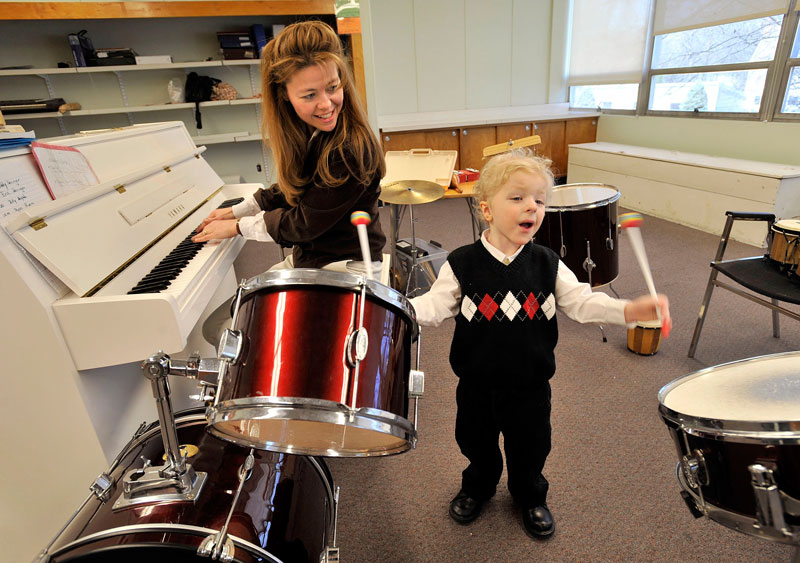Music Therapy is the evidence-based use of clinically prescribed use of musical relating, uses music as a form of non-threatening, non-verbal communication. Music Therapy makes use of a client’s greatest strengths and response to music to develop an individual’s greatest needs. Individualized goals are developed within a therapeutic relationship by a credentialed professional.
Antoinette Morrison certified Music Therapist, and owner of Back Mountain Music Therapy, The Heyward Rooms LLC, (BMMT) uses Music Therapy to develop and strengthen these areas of need in children and adults.
Music Therapy provides a form of expression and an avenue to develop areas that traditional therapies or learning may not provide for either individuals or families facing the following difficulties:
- Autism
- Smith-Magenis Syndrome
- Rubenstein Taybi-Syndrome
- Sensory processing issues
- ADHD, ADD and focus and attention issues
- Irreversible Neurodegenerative brain diseases, such as dementia and more
- Language and communication delay
- Attention and focus issues
- Other developmental/neurological issues
- Trauma-related symptoms
- Behavioral or emotional challenges
- Anxiety and impulsive behavior
- Traumatic or Acquired Brain Injury Symptoms
Continuously proven theory and research indicate that the systematic application of the various elements of musical relating can aid in the following ways:
- Musical relating requires attending, recognizing, identifying, discriminating, organizing, comparing, conceptualizing and recalling sensory (kinesthetic, tactile, visual and auditory) stimuli.
- Musical relating requires not only time-ordered, affect-ordered responses, but also demands the elaborated use and control of body parts, and thus can be used to develop skills in the planning, organizing and controlling of physical and emotional responses.
- Because music is non-verbal communication, it offers the verbal individual a method for expressing feelings that are difficult to express in traditional language, and provides the non-verbal individual an alternate communication mode.
- Music, like traditional language, demands the use of a culturally agreed upon system of time-ordered sound symbols, and thus can aid in the development of the expressive and receptive use of symbols and in the development of sensitivity to the various parameters of sound that are (can be) used symbolically.
- Musical relating requires attending to and listening to others, cooperation, participation, in group goals, maintaining self structure within group situations, etc., and thus can be used to develop adaptive behavior, interaction skills and group skills.
- Music is universally enjoyed and valued, and can be used as both intrinsic motivation and reinforcement for development, learning and behavior change.
What populations does Music Therapy benefit?
Music Therapists are qualified to work with children, adolescents, and adults in a variety of populations and with varying degrees of disability and conditions. Some examples are: autism and other developmental disabilities, speech and hearing impairments, neurological conditions such as traumatic brain injury, stroke and Parkinson’s disease, medical conditions including cancer and NICCU, mental health issues including trauma and substance abuse, geriatric disabilities such as Alzheimer’s and other forms of dementia, and hospice work. Music Therapists therefore work in a variety of settings, often as part of an interdisciplinary team.
Music Therapy Training
A Music Therapist must complete a four-year baccalaureate degree in Music Therapy which covers areas of study such as various forms of musical training, psychology, sociology, etc. Upon completion, a Music Therapist must complete 1040 hours of clinical training with a six month internship. In order to become Board Certified, the Music Therapist must then take a National Board Certification Exam through the Certification Board for Music Therapists (CBMT) which is accredited by the National Commission for Certifying Agencies (NCCA). In order to maintain the Board Certification status, the Music Therapist must provide documentation of 100 hours of continuing education every five years.
In more recent years, many colleges and universities are offering masters or doctoral degrees in Music Therapy in order to expand or advance clinical skills or specialize in fields such as college teaching, administration, fields of supervision or a particular method of Music Therapy.
If you would like more Free, detailed, weekly information in our newsletter sent to your e-mail, type in your e-mail address on the subscription page and click submit. E-mail addresses will not be released, you can cancel at any time.





